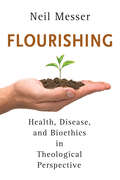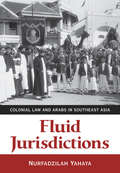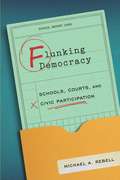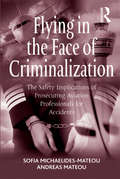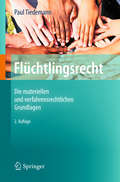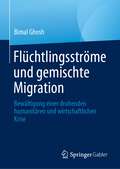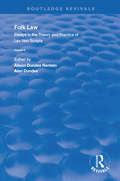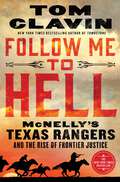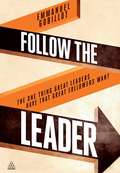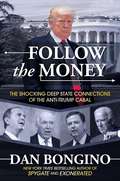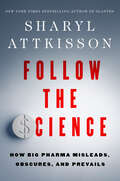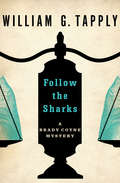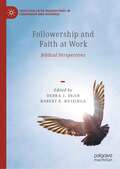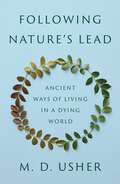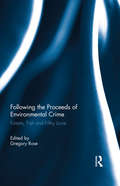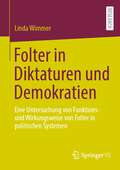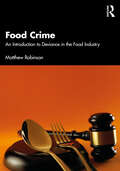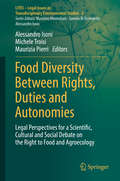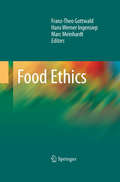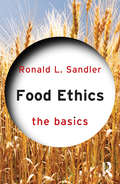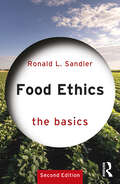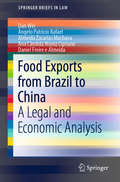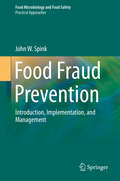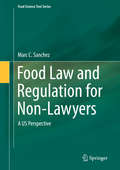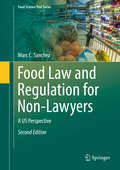- Table View
- List View
Flourishing: Health, Disease, and Bioethics in Theological Perspective
by Neil MesserWe use such words as "health," "disease," and "illness" all the time without stopping to consider exactly what we understand by them. Yet their meanings are far from straightforward, and disagreements over them have important practical consequences in health care and bioethics.In this book Neil Messer develops a distinctive and innovative theological account of these concepts. He engages in earnest with debates in the philosophy of medicine and disability studies and draws on a wide array of theological resources including Barth, Bonhoeffer, Aquinas, and recent disability theologies.By enabling us to understand health in the wider perspective of the flourishing and ultimate destiny of human beings, Messer's Flourishing sheds new light on a range of practical bioethical issues and dilemmas.
Fluid Jurisdictions: Colonial Law and Arabs in Southeast Asia
by Nurfadzilah YahayaThis wide-ranging, geographically ambitious book tells the story of the Arab diaspora within the context of British and Dutch colonialism, unpacking the community's ambiguous embrace of European colonial authority in Southeast Asia. In Fluid Jurisdictions, Nurfadzilah Yahaya looks at colonial legal infrastructure and discusses how it impacted, and was impacted by, Islam and ethnicity. But more important, she follows the actors who used this framework to advance their particular interests. Yahaya explains why Arab minorities in the region helped to fuel the entrenchment of European colonial legalities: their itinerant lives made institutional records necessary. Securely stored in centralized repositories, such records could be presented as evidence in legal disputes. To ensure accountability down the line, Arab merchants valued notarial attestation land deeds, inheritance papers, and marriage certificates by recognized state officials. Colonial subjects continually played one jurisdiction against another, sometimes preferring that colonial legal authorities administer Islamic law—even against fellow Muslims.Fluid Jurisdictions draws on lively material from multiple international archives to demonstrate the interplay between colonial projections of order and their realities, Arab navigation of legally plural systems in Southeast Asia and beyond, and the fraught and deeply human struggles that played out between family, religious, contract, and commercial legal orders.
Flunking Democracy: Schools, Courts, and Civic Participation
by Michael A. RebellThe 2016 presidential election campaign and its aftermath have underscored worrisome trends in the present state of our democracy: the extreme polarization of the electorate, the dismissal of people with opposing views, and the widespread acceptance and circulation of one-sided and factually erroneous information. Only a small proportion of those who are eligible actually vote, and a declining number of citizens actively participate in local community activities. In Flunking Democracy, Michael A. Rebell makes the case that this is not a recent problem, but rather that for generations now, America’s schools have systematically failed to prepare students to be capable citizens. Rebell analyzes the causes of this failure, provides a detailed analysis of what we know about how to prepare students for productive citizenship, and considers examples of best practices. Rebell further argues that this civic decline is also a legal failure—a gross violation of both federal and state constitutions that can only be addressed by the courts. Flunking Democracy concludes with specific recommendations for how the courts can and should address this deficiency, and is essential reading for anyone interested in education, the law, and democratic society.
Flying in the Face of Criminalization: The Safety Implications of Prosecuting Aviation Professionals for Accidents
by Sofia Michaelides-Mateou Andreas MateouTwo parallel investigations take place after every aviation accident: one technical, one judicial. The former must be conducted with the sole intention of making safety recommendations to prevent the recurrence of similar accidents. The judicial investigation, however, has the intention of identifying those parties that have been at fault and to apportion blameworthiness for criminal and civil liability. Consequently, this results in a predicament for those parties that have been identified as having played a role in the accident, a dilemma between not supplying information aimed at enhancing safety and preventing future accidents and, on the other hand, supplying such information which may possibly be used against them in subsequent criminal prosecution. The situation is compounded by inconsistent approaches between different legal systems; aviation professionals may find themselves faced with criminal charges in one country but not in another, and they may also be unsure as to whether statements given during the technical investigation could be used against them in a court of law. Aviation safety is, to a large extent, built upon the trust placed by pilots, ATCOs and other aviation professionals in the process of accident investigation. This book examines the growing trend to criminalize these same people following an accident investigation and considers the implications this has for aviation safety.
Flüchtlingsrecht: Die materiellen und verfahrensrechtlichen Grundlagen
by Paul TiedemannDas Buch vermittelt sowohl die gesetzlichen und rechtsdogmatischen Grundlagen des Flüchtlingsrechts als auch die Geschichte des Asylrechts, ferner stellt es Ansätze für eine philosophische Reflexion des Migrations- und Flüchtlingsrechts unter menschenrechtlichen Aspekten vor. Ausführungen zu Techniken der Sachverhaltsermittlung und der Erstellung von flüchtlingsrechtlichen Gutachten runden die Darstellung ab. Die zweite Auflage berücksichtigt die zahlreichen Gesetzesänderungen seit Erscheinen der Erstauflage sowie eine Vielzahl von seitdem veröffentlichten Gerichtsentscheidungen und das aktuelle Schrifttum.
Flüchtlingsströme und gemischte Migration: Bewältigung einer drohenden humanitären und wirtschaftlichen Krise
by Bimal GhoshDieses Buch bietet eine aufschlussreiche Analyse der sich abzeichnenden Flüchtlings- und gemischten Migrationskrise im Kontext von vier großen, aktuellen Migrationsströmen: zwei in West- und Osteuropa und jeweils einer in Amerika und Asien. Auf die Analyse folgt in jedem Fall eine kluge Identifizierung der Schlüsselfragen und die Präsentation einer Reihe von Vorschlägen für politische Antworten. Die Diskussion wird dann in einen globalen Rahmen gestellt und mit der kürzlich gestarteten Initiative der Vereinten Nationen zur Verabschiedung von Global Compacts für Flüchtlinge und Migranten verknüpft. Der Autor bringt in dieses Buch, das erste seiner Art, seine umfangreiche Erfahrung aus der Beratung und aktiven Zusammenarbeit mit vielen der wichtigsten internationalen Organisationen ein, die sich mit Flüchtlings- und Migrationsfragen befassen. Dieses Buch wird für Forscher, Studenten, NRO, Berufsverbände, nationale Ministerien, internationale Organisationen und Rechtsgruppen in den Bereichen Wirtschaft, öffentliche Finanzen, politische Ökonomie, Menschenrechte und Flüchtlingsrecht sowie internationale Beziehungen und Demografie von Interesse sein.
Folk Law: Essays in the Theory and Practice of Lex Non Scripta: Volume II (Routledge Revivals #Vols. I & Ii)
by Alison Dundes Renteln Alan DundesOriginally published in 1994, Folk Law, a comprehensive two-volme collection of essays, examines the meeting place of folklore - the unwritten law of obligations and prohibitions that are understood and passed on - and jurisprudence. The contributors explore the historical significance and implications of folk law, its continuing influence around the globe, and the conflicts that arise when folk law diverges from official law. Valuable for students and scholars of law, folklore, or anthropology, Renteln and Dundes's extensive casebook marks a rare interdisciplinary approach to two important areas of research.
Follow Me to Hell: McNelly's Texas Rangers and the Rise of Frontier Justice
by Tom ClavinTHE INSTANT NEW YORK TIMES BESTSELLERTom Clavin's Follow Me to Hell is the explosive true story of how legendary Ranger Leander McNelly and his men brought justice to a lawless Texan frontier.In turbulent 1870s Texas, the revered and fearless Ranger Leander McNelly led his men in one dramatic campaign after another, apprehending cattle thieves, desperadoes, border ruffians, and other dangerous criminals and throwing them in jail or, if that's how they wanted it, six feet under. They would stop at nothing in pursuit of justice, even sending twenty-six Rangers across the border to retrieve stolen cattle—taking on hundreds of Mexican troops with nothing but their Sharps rifles and six-guns. The nation came to call them “McNelly’s Rangers.” Set against the backdrop of 200 years of thrilling Texas Rangers history, this page-turner details the tough life along the Texas border that was tamed by a courageous, yet doomed, captain and his team of fearless men. New York Times bestselling author Tom Clavin takes readers deep into the heart of Texas and beyond in this thrilling true account of some of the most legendary frontier lawmen of all time.
Follow the Leader
by Emmanuel GobillotMost leadership models start with trying to identify what great leaders do. In Follow the Leader, global speaker, consultant and leadership expert Emmanuel Gobillot answers a much more fundamental question to anyone wanting to become a great leader: 'what do great followers want?'. In this fast-paced and well-researched book, he identifies the key elements of leadership success and the proven pathways to developing the charisma we all seek in the leaders who truly inspire and motivate us. He breaks down the all-important 'charisma' into eight critical elements, explaining how each component works and offering practical development steps for each. Getting these steps right will transform good leaders into magnets for great followers, harnessing an unstoppable power for business achievement.
Follow the Money: The Shocking Deep State Connections of the Anti-Trump Cabal
by Dan BonginoAs seen on The Ben Shapiro Show! Follow the Money exposes the labyrinth of connections between D.C.&’s slimiest swamp creatures—Democrat operatives, lying informants, desperate and destructive FBI agents, Obama power brokers, CIA renegade John Brennan, George Soros, and more—who conspired to attack Trump by manufacturing one bogus scandal after another.Bestselling author, podcast favorite, and Fox News contributor Dan Bongino delivers the third and most shocking of his acclaimed series chronicling the Deep State war against Donald Trump. Starting with the Trump impeachment hearings, Bongino works forward and backward to piece together the connections of a vast, well-funded cabal of wealthy Democrats and D.C. swamp elite to the non-stop deluge of manufactured scandals launched specifically to attack, destabilize, and ultimately remove Trump and his administration. Zooming in on Ukraine, Bongino unspools a complex sequence of corruption—from the miraculous &“discovery&” of a mysterious black ledger that linked financial transactions to Trump campaign insider Paul Manafort and cast a shadow over the entire Trump team, to Joe Biden&’s unexamined quid pro quo interference with Kyiv politics as he threatened to withhold a loan unless a prosecutor was removed from office. The former Secret Service agent exposes how Glenn Simpson, the corrupt cheerleader behind the lie-filled Steele dossier, wrangled millions from top Democrat donor George Soros to meddle in Ukraine politics. Bongino also reveals Soros&’s desperate multimillion-dollar plan to stop Trump&’s re-election. Using FBI documents, Bongino reveals the outrageous actions of Robert Mueller&’s investigators, who sat on evidence that proved the supposedly damning Trump Tower meeting between a Russian lawyer and senior campaign officials was nothing more than a twenty-minute waste of time for all involved. Other chapters delve into the disturbing presence of Obama&’s fixer, obstruction angel Kathryn &“Kathy&” Ruemmler, who represents a rogues gallery of Russiagate political operatives; the FBI&’s inside source on the National Security Council, Anthony Ferrante, who dedicated himself to the fruitless task of trying to prove the Steele dossier was legitimate; and &“Special Agent 1&” Stephen M. Somma&’s curious obsession with Lt. Gen. Michael Flynn, which was stoked by a Flynn-fixated paid operative named Stefan Halper. Flynn is the centerpiece of one of the book&’s most revealing chapters, in which Bongino deconstructs the FBI&’s elaborate takedown of Trump&’s National Security Advisor, revealing how and why the three-star general was set up not once…but three times. Bongino also returns to the last, desperate attempt to derail Trump—the impeachment trial—and uncovers Adam Schiff&’s lies and the Ukraine-call whistleblower&’s multiple secret ties to never-Trumpers and Schiff himself. In the final chapter, Bongino unveils the newest front to stop Trump: the unleashing of COVID-19 from China and how the disease mutated from a killer plague in Wuhan to a weapon to destroy America&’s economy and, with it, Trump&’s re-election chances. Follow the Money displays dizzying detective work from a truly relentless, passionate, and patriotic reporter. An astonishing chronicle of the relentless war to destroy Donald Trump and his administration, this exposé is a must-read for anyone who wants to unravel the most shocking and corrupt campaign to unseat a sitting president in American history.
Follow the Science: How Big Pharma Misleads, Obscures, and Prevails
by Sharyl AttkissonEmmy Award-winning investigative journalist and New York Times bestselling author Sharyl Attkisson exposes the corruption that has ruled the pharmaceutical industry for decades.Through blatant lies, deep cover-ups, and high-level collusion with government and media, Big Pharma has continuously put profits over people with dangerous results. Now, with her signature investigative rigor and uncompromising commitment to the facts, Sharyl Attkisson takes readers on an shocking journey through the dark underbelly of the pharmaceutical industry.Follow the Science recounts, in exacting detail, how far the pharmaceutical industry and its supporters in medicine, media, and government will go to protect their profits. Attkisson provides shocking examples that reveal the disturbing callousness our government, public health officials, and top researchers are capable of when it comes to the most vulnerable among us. And she explains, in a graphic sense, how some of the most trusted within our society are willing to commit life-threatening ethics violations. When caught, they circle the wagons and marshal forces to defend their bad acts and take steps to cruelly silence the injured and smear those who would expose them.This book includes exclusive, eye-opening evidence including:Financial ties between well-known vaccine promoters and the vaccine industryOutrageous collusion between the news media and Big PharmaHow Big Pharma teaches slanted information to med students and doctorsGovernment officials secretly admitting vaccines caused some cases of autismThe first child seriously injured by Covid vaccines while in Pfizer's studyThe secretive money backing seemingly independent studies and nonprofitsFollow the Science will challenge your assumptions, open your eyes, and inspire you to take action. With its powerful message of truth and justice, this book is a must-read for anyone who cares about the future of our healthcare system and their own family's health.
Follow the Sharks (The Brady Coyne Mysteries #3)
by William G. TapplyThe Boston attorney searches Red Sox Nation for a ballplayer&’s kidnapped son in this &“grittily persuasive&” mystery novel (Kirkus Reviews). For two years, Eddie Donagan was on track to become the greatest Red Sox pitcher of all time. Then one day, without warning, he went from unhittable to ineffective—forcing him to drop out of the Majors before he even hit his prime. Attorney Brady Coyne met Donagan before he turned pro, and stays friends with him even as the faded star drifts into depression, disappearing from his wife and child for days at a time. Finally, the Donagans are thrown into crisis—but it isn&’t Eddie&’s disappearance that causes it. It&’s his son&’s. One morning, ten-year-old E.J. leaves for his paper route and never returns. Soon, the family receives a ransom demand, and Brady agrees to be the go-between. He finds that the son&’s problems stem from the father&’s, and that Eddie Donagan has a dark side no amount of natural talent could overcome.
Followership and Faith at Work: Biblical Perspectives (Christian Faith Perspectives in Leadership and Business)
by Robert B. Huizinga Debra J. DeanThis edited work expands the theory of followership by drawing on biblical examples to illustrate the role of faith in being a better follower. Building on previous scholarship, the book identifies different types of followers and explores how each type meets the needs of a leader in various scenarios. The authors analyze various principles from the lives of followers of Jesus and demonstrate how they apply to modern workplaces. Building upon the growing scholarship on workplace spirituality and organizational leadership, this book offers practical and theoretical perspectives on integrating faith at work.
Following Nature’s Lead: Ancient Ways of Living in a Dying World
by M. D. UsherIn the spirit of E. F. Schumacher&’s Small Is Beautiful, a dazzling and revelatory exploration of what ancient ideas and ways of living can teach us about creating a more sustainable worldHow should we think and live in a world facing environmental catastrophe? In this urgent, original, and wide-ranging book, classicist and farmer M. D. Usher brings together ancient, indigenous, and modern ideas about how to live in this world and describes how we might begin to reconnect with Nature and heal our damaged planet and lives. The ancients hewed close to Nature, the source of their survival, in ways that most of us can scarcely conceive of today, and ancient philosophy often argues that humans should follow Nature&’s lead. Usher makes the case that Nature&’s resilience can serve as a model for our own responses to climate trauma and all the other harms caused by modern lifestyles.Drawing on philosophy, science, economics, art, literature, history, and religion, Following Nature&’s Lead is both an indictment of human overreach and a celebration of human ingenuity and the adaptability of Nature. Here, Plato meets German biologist Jakob von Uexküll, Lucretius illuminates King Lear, and Diogenes the Cynic crosses swords with Henry Thoreau.Filled with vital and inspiring insights, Following Nature&’s Lead shows how the ancients can help teach us to live in accordance with Nature—and why it&’s essential for human survival that we learn to do so without delay.
Following the Proceeds of Environmental Crime: Fish, Forests and Filthy Lucre
by Gregory RoseHuge quantities of natural resources are illegally harvested and their proceeds laundered in the Asia-Pacific region, fostering corruption and undermining environmental governance. Most illegal exploitation and pollution occurs in countries with poor governance capacities, but much of the sale for profit and money laundering occurs in mature markets with well-developed governance capacities. Their asymmetrical enforcement capacities can complement each other. This book explores ways to combat illegal fishing and logging in Asia-Pacific region by the use of cooperative legal measures, particularly anti-money laundering and confiscation of proceeds techniques. Contributors to this volume cover themes including: the nature of transnational environmental crime; patterns in laundering of illicit fish and forest products; networks for distribution of illicit products; weaknesses in current systems for assurance of the legality of products; and international legal cooperation to enforce anti-money laundering laws in relation to illicit products. In considering these topics the book explores how the innovative use of anti-money laundering measures and the seizure of criminal proceeds can as policy options to combat transnational fishery and forestry crimes. The book will be of keen interest to scholars and students of environmental law and criminal law, and excellent use for practitioners in natural resources conservation law.
Folter in Diktaturen und Demokratien: Eine Untersuchung von Funktions- und Wirkungsweise von Folter in politischen Systemen
by Linda WimmerDie vorliegende Arbeit analysiert die mögliche Funktions- und Wirkungsweise von Folter in politischen Systemen und geht vor dem Hintergrund des de facto Verbots der Folter im Völkerrecht der Frage nach, welchen Zweck die Folter im 21. Jahrhundert in Demokratien und Diktaturen eigentlich einnimmt. Die Autorin arbeitet die verschiedensten interdisziplinären Aspekte der Folter heraus. So wird die Gundlage für das theoretische Konstrukt eines Funktions- und Wirkungskataloges gebildet. Nach einem Überblick über die Folter im Laufe der Jahrhunderten und möglicher Sonderformen der Folter wird dieser Katalog anhand von sechs Länderbeispielen analysiert. Drei der Beispiele fallen dabei auf das demokratische Sprektrum der politischen Systeme wie die USA, Spanien und Israel. Die anderen drei nehmen Diktaturen des 21. Jahrhundert in den Fokus (China, Irak und Nigeria).
Food Crime: An Introduction to Deviance in the Food Industry
by Matthew RobinsonThis book addresses the various forms of deviance and criminality found within the conventional food system. This system—made up of numerous producers, processors, distributors, and retailers of food—has significant, far-reaching consequences bearing upon the environment and society.Food Crime broadly outlines the processes and impacts of this food system most relevant for the academic discipline of criminology, with a focus on the negative health outcomes of the US diet (e.g., obesity and diabetes) and negative outcomes associated with the system itself (e.g., environmental degradation). The author introduces the concept of "food criminology," a new branch of criminology dedicated to the study of deviance in the food industry. Demonstrating the deviance and criminality involved in many parts of the conventional food system, this book is the first to provide exhaustive coverage of the major issues related to what can be considered food crime. Embedded in the context of state-corporate criminality, the concepts and practices exposed in this book bring attention to harms associated with the conventional food system and illustrate the degree of culpability of food companies and government agencies for these harms.This book is of interest to students, scholars, and practitioners seeking a more just and healthy food system and encourages further future research into food crimes in the disciplines of criminology, criminal justice, and sociology.
Food Diversity Between Rights, Duties and Autonomies: Legal Perspectives For A Scientific, Cultural And Social Debate On The Right To Food And Agroecology (Lites - Legal Issues In Transdisciplinary Environmental Studies #2)
by Alessandro Isoni Michele Troisi Maurizia PierriThe book reflects on the issues concerning, on the one hand, the difficulty in feeding an ever- increasing world population and, on the other hand, the need to build new productive systems able to protect the planet from overexploitation. The concept of “food diversity” is a synthesis of diversities: biodiversity of ecological sources of food supply; socio-territorial diversity; and cultural diversity of food traditions. In keeping with this transdisciplinary perspective, the book collects a large number of contributions that examine, firstly the relationships between agrobiodiversity, rural sustainable systems and food diversity; and secondly, the issues concerning typicality (food specialties/food identities), rural development and territorial communities. Lastly, it explores legal questions concerning the regulations aiming to protect both the food diversity and the right to food, in the light of the political, economic and social implications related to the problem of feeding the world population, while at the same time respecting local communities’ rights, especially in the developing countries. The book collects the works of legal scholars, agroecologists, historians and sociologists from around the globe.
Food Ethics
by Franz-Theo Gottwald Marc Meinhardt Hans Werner IngensiepIn this first decade of the 21st century, more than 854 million people in the world are starving, while industrial nations are debating about obesity, generating energy from food plants, and a myriad of other topics many African and south Asian nations could only fathom. In this great discord, there have arisen many interdisciplinary discussions about problems in the field of applied Ethics, with regards to food, that are crossing a considerably wide spectrum of disciplines, such as: obesity, traceability, agro-food biotechnology, dairy industry, transgenic plants, novel food, bio fuels, world-trade system, etc. This book presents international discussions and information concerning food ethics in its current state. It presents a variety of important aspects in the field of food ethics with respect to positions, instruments and applications of issues surrounding nutrition. A great deal of the book will concern itself with discussing different ethical positions and problems of current interests, as explained by experts of the "food-ethics-community". The articles will focus on the reality of global food problems through two main issues: current questions of nutrition in the specific contexts of field and experience, ethical tools, ideas and suggestions concerning long-term steps for solutions. The appendix presents a collection of current declarations and political statements - visions, proposals and goals in a worth living world in general and concerning specific problems - water, healthy food, the human right to food, sustainability and food sovereignty.
Food Ethics: The Basics (The Basics)
by Ronald L. SandlerFood Ethics: The Basics is a concise yet comprehensive introduction to the ethical dimensions of the production and consumption of food. It offers an impartial exploration of the most prominent ethical questions relating to food and agriculture including: • Should we eat animals? • Are locally produced foods ethically superior to globally sourced foods? • Do people in affluent nations have a responsibility to help reduce global hunger? • Should we embrace bioengineered foods? • What should be the role of government in promoting food safety and public health? Using extensive data and real world examples, as well as providing suggestions for further reading, Food Ethics: The Basics is an ideal introduction for anyone interested in the ethics of food.
Food Ethics: The Basics (The Basics)
by Ronald L. SandlerFood Ethics: The Basics is a concise yet comprehensive introduction to the ethical dimensions of the production and consumption of food. It offers an impartial exploration of the most prominent ethical questions relating to food and agriculture, including: Should we eat animals? Are locally produced foods ethically superior to globally sourced foods? Do people in affluent nations have a responsibility to help reduce global hunger? Should we embrace bioengineered foods? What should be the role of government in promoting food safety and public health? This second edition has been revised and updated throughout, not only to take in the latest empirical and policy information, but also to address the impact of major issues such as the COVID-19 pandemic, Russia’s invasion of Ukraine, AI and machine learning, and the rapid growth of the "gig economy." Using extensive data and real-world examples, as well as providing suggestions for further reading, Food Ethics: The Basics is an ideal introduction for anyone interested in the ethics of food.
Food Exports from Brazil to China: A Legal and Economic Analysis (SpringerBriefs in Law)
by Dan Wei Ângelo Patrício Rafael Almeida Zacarias Machava Ana Cândida Muniz Cipriano Daniel Freire e AlmeidaThis book provides an essential overview of trade between Brazil and China, analyzes the regulatory framework for Brazil’s foodstuff exportation and China’s foodstuff importation, and identifies the main products, market shares, barriers to market access, and e-commerce strategies. The book also addresses the importance of consumer health and the latest developments regarding the United Nations Guidelines for Consumer Protection. Lastly, based on the statistics for Brazil’s food exports to Mainland China, Hong Kong and Macau as separate customs areas, the book explores the role of Macau and calls for intensifying its links with Portuguese-speaking countries, including Brazil.
Food Fraud Prevention: Introduction, Implementation, and Management (Food Microbiology and Food Safety)
by John W. SpinkThis textbook provides both the theoretical and concrete foundations needed to fully develop, implement, and manage a Food Fraud Prevention Strategy. The scope of focus includes all types of fraud (from adulterant-substances to stolen goods to counterfeits) and all types of products (from ingredients through to finished goods at retail). There are now broad, harmonized, and thorough regulatory and standard certification requirements for the food manufacturers, suppliers, and retailers. These requirements create a need for a more focused and systematic approach to understanding the root cause, conducting vulnerability assessments, and organizing and implementing a Food Fraud Prevention Strategy. A major step in the harmonizing and sharing of best practices was the 2018 industry-wide standards and certification requirements in the Global Food Safety Initiative (GFSI) endorsed Food Safety Management Systems (e.g., BRC, FSSC, IFS, & SQF). Addressing food fraud is now NOT optional – requirements include implementing a Food Fraud Vulnerability Assessment and a Food Fraud Prevention Strategy for all types of fraud and for all products. The overall prevention strategy presented in this book begins with the basic requirements and expands through the criminology root cause analysis to the final resource-allocation decision-making based on the COSO principle of Enterprise Risk Management/ ERM. The focus on the root cause expands from detection and catching bad guys to the application of foundational criminology concepts that reduce the overall vulnerability. The concepts are integrated into a fully integrated and inter-connected management system that utilizes the Food Fraud Prevention Cycle (FFPC) that starts with a pre-filter or Food Fraud Initial Screening (FFIS). This is a comprehensive and all-encompassing textbook that takes an interdisciplinary approach to the most basic and most challenging questions of how to start, what to do, how much is enough, and how to measure success.
Food Law and Regulation for Non-Lawyers
by Marc C. SanchezThe book offers a succinct overview of key topics and core concepts for food scientists, quality managers, and others who need to understand the regulation of food and dietary supplements in the U. S. It was designed and modeled after a six-week introduction to food law course currently taught at Northeastern University, and serves as a practical tool for regulatory professionals. The book includes a chapter on each major topic, with summations of the legislative history and general legal landscape. Each chapter focuses the reader on major and emerging issues encountered by facilities. A comparative law section at the end of every chapter offers readers an ability to view alternative methods of regulation and enforcement. This design is unique and allows students and working professionals alike to understand core concepts and the practical application of the law to their work. Using a modified casebook method approach, the book also serves as a practical tool for regulatory professionals.
Food Law and Regulation for Non-Lawyers: A Us Perspective (Food Science Text Ser.)
by Marc C. SanchezDesigned and modeled after a six-week introductory food law course taught at Northeastern University, Food Law and Regulation for Non-Lawyers offers a succinct overview of key topics and core concepts for food scientists, quality managers, and others who need to understand the regulation of food in the U.S. This second edition includes critical updates on the Food Safety Modernization Act-- the first change to the food safety laws in over 70 years. The seven foundational rules, finalized in 2015, are discussed in detail. The new edition also includes other regulatory updates such as the new Nutrition Fact Panel, changes to the definition of fiber, and the FDA’s attempt to regulate the widely used “healthy” claim. These timely updates, along with the core concepts of the first edition, make the volume an essential and practical tool for regulatory professionals.
